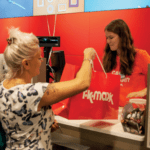TK Maxx is known for its business strategy of selling at up to 60% off the recommended retail price. The off-price retailer’s stated mission is “to get customers the labels they adore at the prices they love”. But there’s nothing cut-price about an approach to customer service that is active and effective across sales channels. That’s no doubt part of the reason why its highly active social media accounts feature praise from fashion-savvy shoppers who prefer not to pay the full price for the designer fashion, homewares, toys and other products that it sells. On its website, TK Maxx describes a buying process in which buyers take an “opportunistic and entrepreneurial” approach to snapping up products at low prices. Some products come as a result of brand overstocks, some when vendors want to clear stock quickly, and others are a result of department store order cancellations. Its products are sold in what TK Maxx describes as a “no-frills way of working” that “helps us to pass spectacular savings on”.
But when InternetRetailing researchers put TK Maxx customer service to the test by phone, email and over social media, the experience was far from that which might be expected by a no-frills retailer. Responses across all channels were fast. More than that, its performance was consistently above average in resolving problems.
The clothing retailer performed substantially better than other IRUK Top500 companies in the speed of its response to customer queries. Customer service staff took an average response time of 35m to resolve a Facebook query – well ahead of the average 53h response time.
An email query was also answered in under an hour. That’s not only well ahead of the 27h average for IRUK Top500 retailers but also beats the three-day response time that TK Maxx promises on its own website. Phone queries were also answered extremely quickly, at 1m 13s. Its representatives scored top marks for issue resolution and service quality in this area.
Recently, TK Maxx came 11th in the DMA’s (Direct Marketing Association) Customer Engagement index, which asked 1,000 consumers what their favourite brand was. This put it ahead of companies such as Apple, Tesco and Zara.






